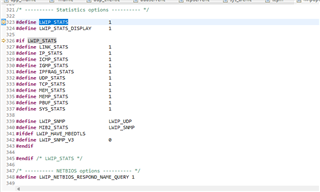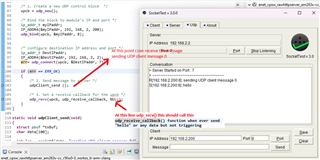Part Number: AM2634
Tool/software:
i team,
I am working on UDP client implementation on evaluation Board so, i am editing this enet_cpsw_rawhttpserver_am263x-cc_r5fss0-0_nortos_ti-arm-clang Project.
Here i am facing an issue when ever evl board(UDP Client) send a data to the server(Computer) it deliver successfully but whenever server send data to client its not deliver to the client(Evl board).
7382.enet_cpsw_rawhttpserver_am263x-cc_r5fss0-0_nortos_ti-arm-clang.zip
Kindly Find out the test projct and please Let me know the issue. Your feedback is more appriciated




